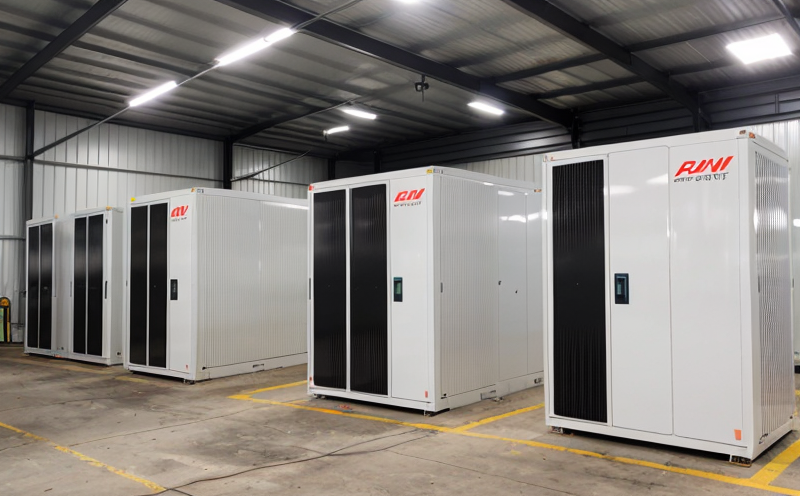ISO 8715 Safety Testing of Battery Systems in EV Applications
The International Organization for Standardization (ISO) specifies a series of safety standards to ensure that battery systems used in electric vehicles (EVs) are safe and reliable. Among these, ISO 8715 focuses specifically on the safety testing of battery systems in EV applications. This standard covers various aspects of battery safety, including mechanical integrity, thermal stability, electrical insulation, and internal short-circuiting.
The objective of ISO 8715 is to provide a framework for manufacturers to ensure that their battery systems meet stringent safety requirements before they are deployed in real-world conditions. By adhering to these standards, manufacturers can demonstrate compliance with global regulatory requirements and build trust among consumers who value safety above all else.
At our laboratory, we specialize in providing ISO 8715 compliant testing services for battery systems used in EV applications. Our team of experts uses state-of-the-art equipment and follows rigorous protocols to ensure accurate and reliable test results. We offer a full range of services including but not limited to:
- Thermal cycling tests
- Voltage imbalance monitoring
- Cold temperature performance testing
- Overcharge protection evaluation
- Short circuit resistance assessment
- Mechanical abuse testing (drop, vibration)
- Battery management system (BMS) validation
- Cell-to-pack and pack-to-vehicle integration tests
In addition to these core services, we also provide custom solutions tailored to the unique needs of our clients. Our experienced engineers work closely with you to understand your specific requirements and develop a testing plan that meets both regulatory expectations and business goals.
Our commitment to quality extends beyond just performing tests; it includes providing detailed reports that outline every aspect of the test procedure, results, and interpretations. These reports serve as valuable tools for decision-making processes within R&D departments and help ensure ongoing improvements in product design and safety features.
Scope and Methodology
The scope of ISO 8715 encompasses a wide array of tests designed to evaluate different aspects of battery safety. The methodology outlined in this standard provides clear guidance on how each test should be conducted, ensuring consistency across laboratories worldwide.
- Thermal Stability Tests: These involve subjecting batteries to extreme temperatures both above and below their operating range to assess their ability to withstand thermal stresses without failing.
- Voltage Imbalance Monitoring: This test checks whether there is any imbalance in the voltage distribution among cells within a battery pack, which could lead to overheating or even fire if left unchecked.
- Cold Temperature Performance Testing: Batteries are exposed to cold temperatures to determine their functionality and capacity retention under such conditions.
- Overcharge Protection Evaluation: This test evaluates how well a battery can recover after being overcharged, ensuring that it does not suffer permanent damage due to improper charging practices.
- Short Circuit Resistance Assessment: The aim here is to measure the current carrying capacity of individual cells and entire battery packs under short circuit conditions to ensure they do not exceed safe limits.
- Mechanical Abuse Testing (Drop, Vibration): Batteries are subjected to simulated real-world scenarios where mechanical abuse might occur, such as being dropped or exposed to vibrations during transport or usage.
- Battery Management System (BMS) Validation: This involves verifying that the BMS accurately monitors and controls battery operations, preventing overcharging, overheating, and other potential hazards.
We employ advanced instrumentation such as thermal cameras, multimeters, and data acquisition systems to conduct these tests. Our laboratory adheres strictly to ISO 8715 guidelines throughout all stages of testing, from sample preparation to final analysis.
Industry Applications
The importance of ISO 8715 cannot be overstated in the context of today’s rapidly evolving automotive industry. As more companies focus on developing sustainable transportation solutions powered by electric vehicles (EVs), ensuring that these vehicles are equipped with safe and reliable battery systems becomes paramount.
Our services cater not only to original equipment manufacturers (OEMs) but also to suppliers of components like batteries, chargers, and power electronics. By partnering with us early in the development process, you can gain valuable insights into potential risks associated with your products and implement necessary changes before they reach production stages.
Moreover, compliance with ISO 8715 helps companies meet stringent regulatory requirements imposed by various countries around the world. This includes adhering to local laws regarding product safety standards as well as international agreements like those set forth by the United Nations Economic Commission for Europe (UNECE).
International Acceptance and Recognition
ISO 8715 enjoys widespread international acceptance due to its comprehensive approach towards ensuring battery safety in EV applications. Laboratories accredited according to this standard are recognized globally, making it easier for manufacturers to export their products into different markets without additional certification costs.
- Australia: The Australian Standard AS 60285-1:2014 incorporates many elements from ISO 8715, ensuring seamless integration between local regulations and international best practices.
- Europe: ISO 8715 is widely adopted in European Union member states as part of their harmonized technical regulations for electric vehicles. Compliance with this standard facilitates market access across the EU.
- North America: Although not explicitly referenced in North American regulatory frameworks, ISO 8715 serves as a valuable reference document for ensuring safety during product certification processes carried out by bodies such as Underwriters Laboratories (UL).
The global nature of our testing services coupled with our strong reputation allows us to serve clients from diverse geographical locations confidently knowing that they will receive consistent, high-quality results wherever their products may end up.





